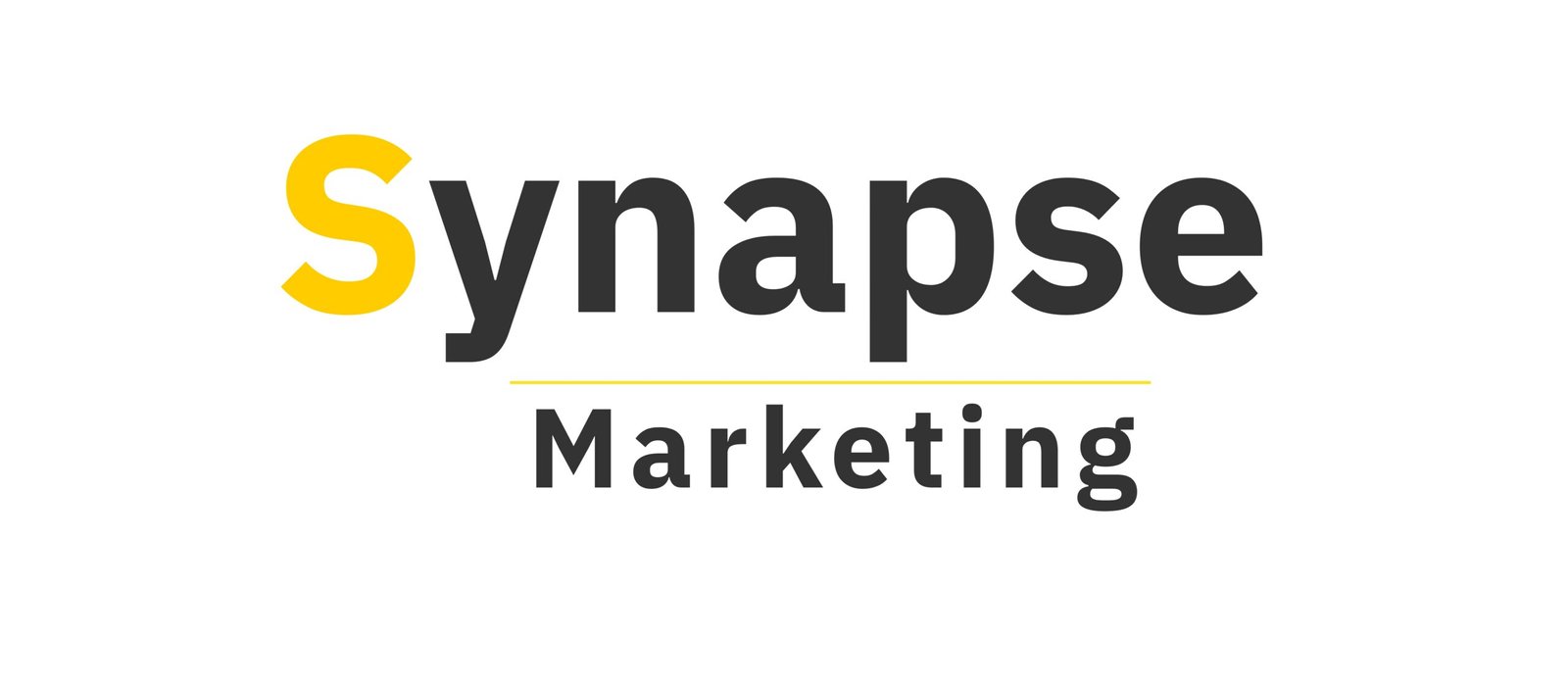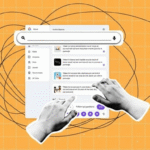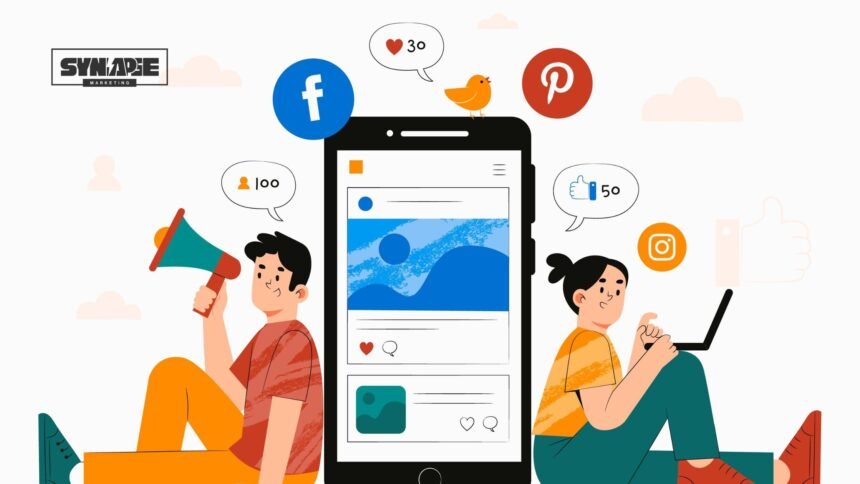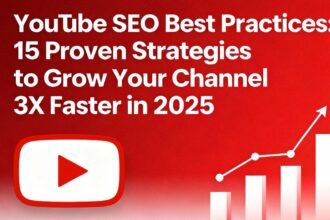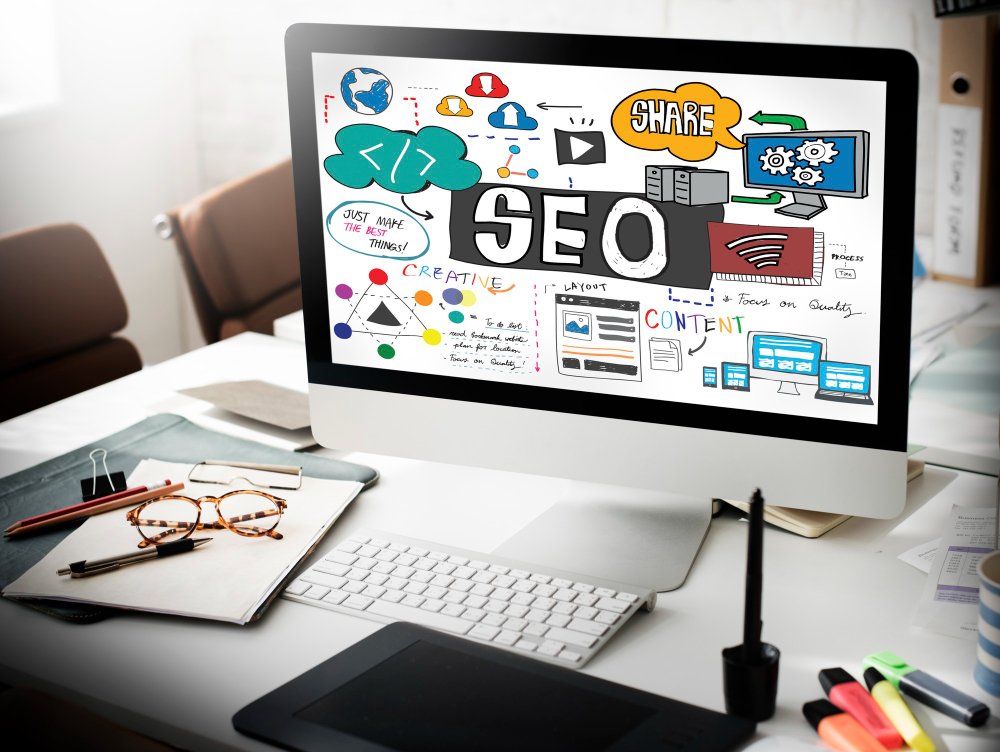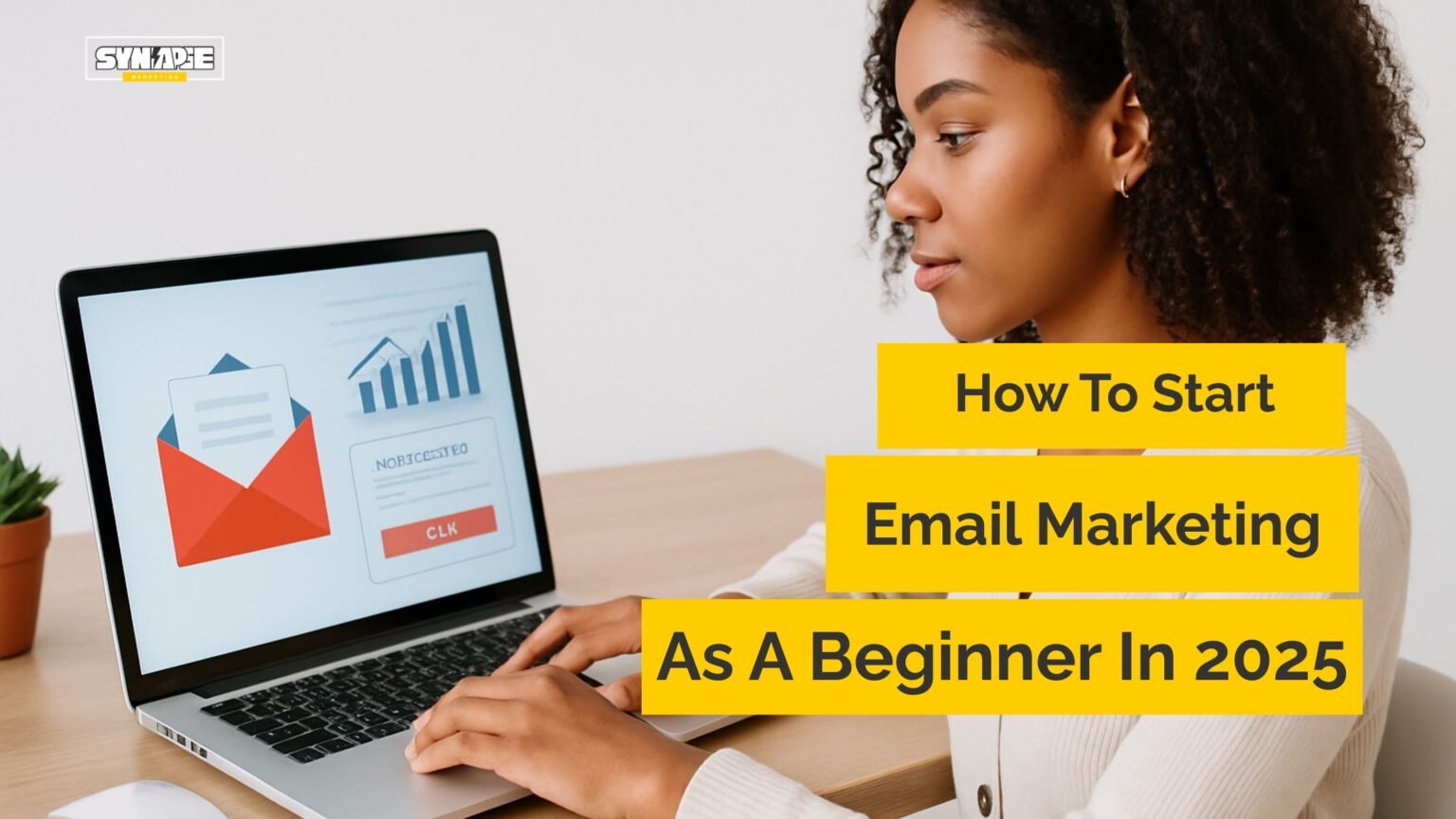I’ve worked with dozens of Nigerian SMEs and marketing agencies, and one thing is clear: understanding the Difference Between Digital Marketing And Social Media Marketing can make or break your online growth. In a landscape brimming with online marketing examples, it’s tempting to lump every digital channel into a single bucket. Yet conflating digital marketing channels like SEO, email campaigns, and PPC with social media marketing channels such as Facebook and Instagram ads can dilute your strategy and waste your budget.
As a growth consultant, I know that small business marketing Nigeria demands precision. You need to allocate resources where they perform best: digital advertising might drive immediate conversions, while social media engagement builds long-term brand loyalty. Recognizing the unique roles of each approach helps you craft an integrated plan that fuels lead generation, boosts brand awareness online, and optimizes conversion rate optimization.
In this publication, I’ll walk you through core definitions, highlight key distinctions, and share case studies from Nigerian startups. You’ll learn how to choose the right mix of digital marketing strategy and social media marketing strategy, tailored to your audience of business owners, co-founders, and sales executives. By the end, you’ll see exactly why the Difference Between Digital Marketing And Social Media Marketing isn’t just academic—it’s the blueprint for turning clicks into customers.
What Is Digital Marketing? Difference Between Digital Marketing And Social Media Marketing Explained
Defining Digital Marketing: Key Digital Marketing Channels
I define digital marketing as the strategic use of all online channels to attract, engage, and convert prospects into customers. Unlike social media marketing which zeroes in on platforms like Facebook or Instagram, digital marketing spans a broader set of tactics, including:
- Search Engine Optimization (SEO): Optimizing your website and content to rank higher in search results, driving organic traffic. Think of it as the backbone of your digital marketing strategy, ensuring your brand appears when prospects search for relevant terms like “small business marketing Nigeria.”
- Pay-Per-Click (PPC) Advertising: Paid placements on search engines and partner sites. With PPC advertising, you bid on keywords (e.g., “lead generation online”) to show ads atop search results, paying only when someone clicks.
- Email Marketing Campaigns: Targeted emails sent to segmented lists, nurturing leads with personalized content and offers.
- Content Marketing: Crafting blog posts, videos, and whitepapers that solve real problems—whether it’s explaining “conversion rate optimization” or showcasing digital advertising ROI through case studies.
- Display & Programmatic Ads: Banner ads and automated ad buys across the web, reaching users based on behavior and demographics.
These channels work in concert, allowing me to design a digital marketing strategy that drives both immediate conversions and long-term brand equity.
Difference Between Digital Marketing And Social Media Marketing in Scope
One of the most critical aspects of the Difference Between Digital Marketing And Social Media Marketing lies in their scope:
- Digital Marketing Scope: Encompasses every touchpoint where a user interacts with your brand online. From the moment they type a query into Google (SEO vs social media origin) to receiving an email newsletter, each interaction falls under digital marketing’s umbrella.
- Social Media Marketing Scope: Focuses exclusively on platforms where communities gather—Facebook, Instagram, LinkedIn, TikTok—and leverages content, ads, and engagement to build relationships and amplify brand awareness online.
By understanding that digital marketing is the macro strategy and social media marketing is a specialized subset, I guide Nigerian SMEs and marketing executives to allocate budgets wisely. For instance, an email marketing campaign might deliver a 4:1 ROI but requires a strong lead magnet, while a targeted Instagram marketing tip could spark viral engagement among millennials.
What Is Social Media Marketing? Difference Between Digital Marketing And Social Media Marketing Explained
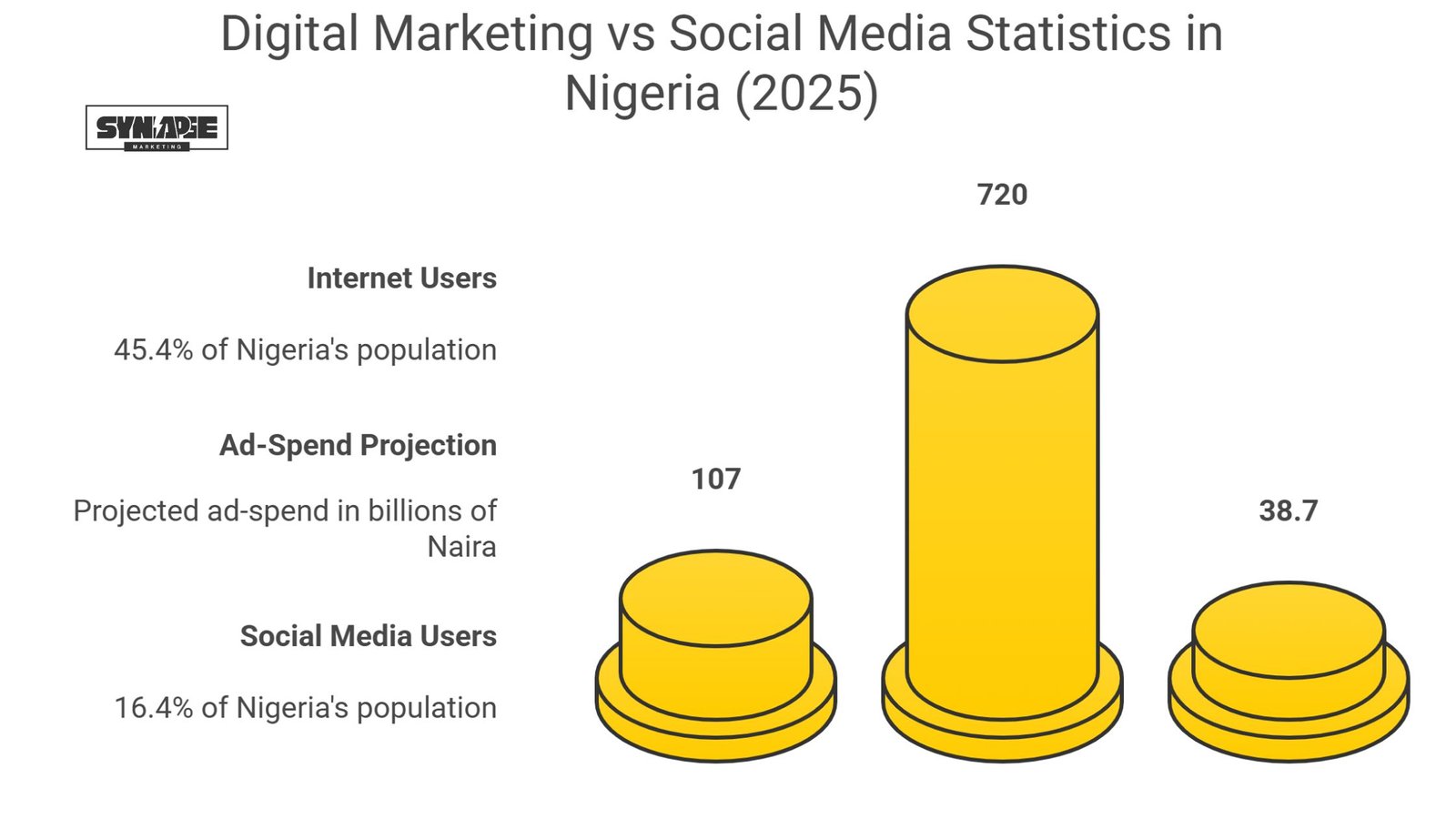
I view social media marketing as the targeted practice of creating and distributing content on platforms where communities gather—Facebook, Instagram, LinkedIn, TikTok, and Twitter—to build relationships, amplify brand voice, and drive conversions. Unlike broader digital marketing channels such as SEO or email campaigns, social media marketing zeroes in on human connection and social media engagement.
In Nigeria, there were 38.7 million active social media identities at the start of 2025, representing 16.4 percent of our population. This audience spans youthful urban professionals on Instagram and TikTok, B2B decision-makers on LinkedIn, and mass-market consumers on Facebook. Each channel demands its own content approach:
- Facebook Advertising: Highly customizable audience targeting based on demographics, interests, and behaviors. Ideal for lead generation online and brand awareness online at scale.
- Instagram Marketing: Visual storytelling and Instagram marketing tips—like carousel posts and Reels—drive engagement among millennials and Gen Z.
- LinkedIn Marketing for B2B: Thought leadership articles, sponsored InMail, and professional community building connect with executives and marketing executives.
- TikTok & YouTube Marketing: Short-form videos and tutorials capture attention quickly, tapping into Nigeria’s growing mobile-first audience.
- Twitter (X) Campaigns: Real-time conversations, customer service, and trend-hijacking deliver visibility and foster brand-human interaction.
Difference Between Digital Marketing And Social Media Marketing in Objectives
The Difference Between Digital Marketing And Social Media Marketing becomes crystal clear when you examine objectives:
- Digital Marketing Objectives: I prioritize measurable actions like click-through rate, cost per acquisition (CPA), and conversion rate optimization. For example, a PPC advertising campaign might aim for a 5 percent conversion rate on targeted search terms.
- Social Media Marketing Objectives: I focus on community growth, content resonance, and long-term brand equity. Metrics include engagement rate (likes, comments, shares), follower growth, and social share of voice. A viral Instagram Reel might not drive immediate sales, but it builds trust and fuels organic reach.
By distinguishing these objectives, I craft campaigns that align with your business goals—whether it’s driving an email sign-up through a well-placed banner ad or sparking conversation via a Twitter thread. Understanding this nuance prevents you from pouring your budget into tactics misaligned with your desired outcomes.
Key Differences Between Digital Marketing And Social Media Marketing
Understanding the Difference Between Digital Marketing And Social Media Marketing empowers you to allocate resources wisely, tailor your messaging, and hit your KPIs. In my work with Nigerian SMEs, I’ve found four pillars where these disciplines diverge: strategy & tactics, metrics & KPIs, budget & ROI, and audience targeting. I’ll walk you through each so you can leverage the strengths of both digital and social media marketing channels.
Strategy & Tactics
When I design a marketing plan, the Difference Between Digital Marketing And Social Media Marketing often starts with the channels and tactics I choose:
- Digital Marketing Strategy & Tactics:
- SEO vs Social Media: I optimize on-page and off-page elements—keywords, backlinks, page speed—so my clients rank for high-value queries like “small business marketing Nigeria.”
- PPC Advertising: I set up Google Ads campaigns targeting transactional search terms (e.g., “lead generation online”), adjusting bids by device and geography.
- Email Marketing Campaigns: I craft automated workflows—welcome series, abandoned cart reminders—that nurture and convert leads. Each email sequence includes A/B tests for subject lines and calls to action.
- Content Marketing & Display Ads: I develop long-form articles, infographics, and remarketing banners to guide prospects down the funnel.
- Social Media Marketing Strategy & Tactics:
- Platform-Specific Content: I produce carousel posts for LinkedIn’s B2B audience, Reels for Instagram’s mobile-first users, and short TikTok clips showcasing product demos.
- Community Management: I actively respond to comments, host live Q&A sessions, and leverage polls to build engagement.
- Influencer Collaborations: I partner with local Nigerian micro-influencers to amplify brand messages authentically.
- Paid Social Campaigns: I launch Facebook Lead Ads and Instagram Story Ads, using look-alike audiences to capture new prospects.
By contrasting these tactics, I ensure the Difference Between Digital Marketing And Social Media Marketing is clear: digital marketing drives volume and conversion through search and email, while social media marketing builds relationships and engagement.
Metrics & KPIs
Measuring success is where the Difference Between Digital Marketing And Social Media Marketing really comes alive:
- Digital Marketing Metrics & KPIs:
- Click-Through Rate (CTR) and Cost Per Click (CPC) on search ads.
- Conversion Rate Optimization (CRO): percentage of visitors who complete desired actions—purchases, form fills, downloads.
- Email Open and Click Rates: I target open rates of 46–50% and click-through rates of 2.6–3% for well-optimized campaigns.
- Organic Traffic Growth: month-over-month increases in sessions from SEO efforts.
- Social Media Marketing Metrics & KPIs:
- Engagement Rate: likes, comments, shares per post, benchmarked at 1–3% on Facebook and Instagram.
- Follower Growth Rate: tracking net new followers weekly.
- Social Share of Voice: brand mentions versus competitors in social conversations.
- Lead Form Submissions via Paid Social: cost per lead and lead quality assessments.
This comparison highlights how I tailor dashboards: digital marketing data flows into Google Analytics and Marketing Automation Platforms, while social media insights come from native analytics or tools like Hootsuite.
Budget & ROI
Budget allocation often hinges on the Difference Between Digital Marketing And Social Media Marketing ROI profiles:
- Digital Marketing Budget & ROI:
- Email Marketing ROI: for every $1 spent, businesses earn an average $36 in return—a 3,600% ROI.
- SEO ROI: organic search delivers an average 317%–1,389% return, depending on industry and maturity of content.
- PPC ROI: varies by keyword competitiveness, but well-managed campaigns often break even within the first two weeks, then yield positive ROI.
- Social Media Marketing Budget & ROI:
- Paid Social ROI: typically ranges between 250%–400% when targeting warm audiences with retargeting ads.
- Organic Social ROI: harder to quantify directly, but each 1% increase in engagement can lift website visits by 0.5%–1% (DataReportal, 2025).
- Influencer ROI: micro-influencers deliver up to 11x higher ROI than macro-influencers on a cost-per-engagement basis.
By understanding these figures, I guide SMEs to invest more heavily in email and SEO for immediate revenue, while dedicating a smaller—but still significant—portion to social media to nurture long-term relationships.
Audience Targeting
Finally, audience targeting underscores the Difference Between Digital Marketing And Social Media Marketing:
- Digital Marketing Audience Targeting:
- Behavioral & Keyword Intent: I capture users actively searching for terms like “digital marketing strategy” or “PPC advertising Nigeria.”
- Email Segmentation: lists are segmented by industry, purchase history, and engagement level to deliver hyper-relevant messages.
- Geotargeting & Time-Based Bidding: adjusting bids for peak Nigerian business hours (9 AM–5 PM WAT) to maximize conversions.
- Social Media Marketing Audience Targeting:
- Demographic & Interest-Based: Facebook’s targeting options let me reach Nigerians aged 25–45 interested in entrepreneurship, small business, or marketing automation tools.
- Look-Alike Audiences: I create look-alikes from high-value email subscribers to find similar prospects on Instagram and LinkedIn.
- Custom Audiences: retargeting website visitors, video watchers, or app users with tailored social ads.
By dissecting these targeting approaches, I ensure that each naira spent addresses the right person at the right time, clearly demonstrating the Difference Between Digital Marketing And Social Media Marketing in action.
Benefits & Limitations: Difference Between Digital Marketing And Social Media Marketing
When I advise Nigerian SMEs, I always weigh the benefits of digital marketing vs social media marketing before recommending a budget split. While both channels drive growth, they excel in different areas—and each comes with its own limitations.
Advantages of Digital Marketing
- Measurable ROI: With tools like Google Analytics and marketing automation platforms, I track every naira spent down to the conversion. For example, email marketing typically delivers a $36 return per $1 invested—proof that a well-optimized email marketing campaign can fuel rapid revenue growth.
- High-Intent Traffic: By leveraging SEO vs social media targeting, I capture users actively searching for services (e.g., “SME digital marketing”), increasing the likelihood of purchase.
- Scalable Automation: Automated lead generation online funnels work around the clock. I set up drip campaigns and dynamic remarketing, ensuring prospects receive the right content at the right time—without manual intervention.
- Cost Predictability: PPC budgets can be capped daily or monthly, giving me full control over spend and ensuring consistent display & programmatic ads performance.
Limitations of Digital Marketing
- Longer Ramp-Up: SEO and content marketing may take 3–6 months to rank for competitive digital marketing channels, meaning slower initial ROI.
- Creative Constraints: Display ads and search copy are often limited by character counts and static formats, making it harder to convey complex brand narratives.
- Technical Expertise Required: Setting up and maintaining marketing automation, advanced SEO, and conversion tracking demands specialized skills—something many SMEs must outsource.
Advantages of Social Media Marketing
- Rapid Engagement: A well-crafted Reel or Facebook Live can generate thousands of views and interactions within hours. I’ve seen brands boost social media engagement by up to 400% after a single viral post.
- Community Building: Through polls, comments, and direct messages, I foster genuine connections, turning followers into brand advocates and enhancing brand awareness online.
- Creative Freedom: Platforms like Instagram and TikTok encourage experimentation with short-form video, influencers, and user-generated content—ideal for storytelling and product demos.
- Affordable Testing: Organic posts, stories, and even small paid social budgets allow me to test messaging, visuals, and calls to action quickly before scaling successful campaigns.
Limitations of Social Media Marketing
- Algorithm Dependence: Organic reach fluctuates based on platform algorithms. What works one month may underperform the next, forcing constant adjustments.
- Lower Direct Conversions: Social media often drives top-of-funnel engagement rather than immediate sales. I typically need to retarget engaged users with PPC advertising or email sequences for conversion.
- Resource Intensive: Consistent posting, community management, and influencer coordination require dedicated time and personnel—another cost consideration for SMEs.
By understanding these trade-offs, I guide business owners and marketing executives to build a balanced digital marketing strategy that leverages SEO, email, and PPC for direct revenue, while using social media marketing channels to nurture relationships, boost brand equity, and sustain long-term growth.
Integrating Digital Marketing And Social Media Marketing for Maximum Impact
When I build a digital marketing strategy, I always ensure that the Difference Between Digital Marketing And Social Media Marketing works to our advantage rather than causing silos. By blending digital marketing channels like SEO, email marketing campaigns, and PPC advertising with social media marketing channels, I create a cohesive journey that guides prospects from discovery to purchase.
First, I use SEO insights to inform social media content. For example, keywords driving organic traffic—such as “digital marketing trends Nigeria” and “SME digital marketing”—become the basis for LinkedIn articles and Instagram Reels. This alignment boosts your website’s authority (SEO vs social media synergy) while feeding social platforms with proven topics.
Next, I repurpose high-performing blog posts into social media assets. A data-driven article on conversion rate optimization can transform into an infographic for Facebook and a series of tweets with key statistics. This tactic stretches your content budget and maintains brand consistency across channels.
I also leverage email lists for social targeting. By uploading segmented subscriber lists to Facebook and Instagram, I run look-alike audience campaigns that mirror your most engaged customers. These paid social ads drive new leads back into your email marketing campaigns, where automation nurtures them through personalized workflows.
Finally, I track performance in an integrated dashboard. Monitoring click-through rate, cost per acquisition, and social media engagement side by side shows me exactly how the Difference Between Digital Marketing And Social Media Marketing translates into tangible results. If a Facebook campaign generates high engagement but low conversions, I adjust the PPC budget or refine my email sequence.
By orchestrating these tactics, I ensure that every naira you invest compounds across channels—amplifying reach, deepening engagement, and maximizing ROI.
Choosing Between Digital Marketing And Social Media Marketing for Your SME
When I consult with founders and marketing managers, the decision to allocate budget between digital marketing and social media marketing hinges on three core factors: business objectives, available resources, and audience behavior. By systematically evaluating these dimensions, I help Nigerian SMEs craft a custom mix that maximizes digital advertising ROI and drives meaningful social media engagement.
- Aligning with Business Goals
First, I ask: What outcome matters most, immediate sales or long-term brand loyalty? If you need quick lead generation and measurable conversions, lean into PPC advertising and email marketing campaigns. For instance, a targeted Google Ads push around “lead generation online” can deliver form fills within days, with a typical conversion rate optimization bump of 3–5% . Conversely, if your focus is on building community and nurturing prospects over time, invest more in social media marketing channels like Instagram Reels or LinkedIn articles, which excel at fostering brand awareness online and trust. - Assessing Budget & Resources
Next, I evaluate your team’s capabilities and your cash flow. High-impact digital tactics—advanced SEO setups, marketing automation, and programmatic ads—often require specialized skills or agency partnerships. While the average SME sees a 3,600% ROI from email, initial setup costs can be significant. On the other hand, organic social content can be produced in-house with smartphones and basic editing tools. Paid social experiments, starting with as little as NGN 50,000 per month, allow you to test messaging rapidly before scaling. - Understanding Your Audience
Finally, I analyze where your target customer spends time online. According to DataReportal, 87% of Nigerian internet users browse social media daily, with Facebook and WhatsApp leading the pack. If your buyer persona is a B2B decision-maker, LinkedIn’s 2.6 million Nigerian users and its business-focused environment justify a higher spend on sponsored InMail and content promotion. Conversely, if your audience skews younger and more mobile-first, allocating 40–60% of your budget to short-form video on TikTok and Instagram can drive a 200–300% increase in social media engagement compared to static posts .
By rigorously matching objectives, resources, and audience habits, I craft a balanced strategy that leverages the Difference Between Digital Marketing And Social Media Marketing to its full potential—driving both immediate sales and sustainable growth. This tailored approach ensures your SME doesn’t just follow trends but leads the market with data-backed, cost-effective campaigns.
Nigerian SME Case Studies: Difference Between Digital Marketing And Social Media Marketing in Action
To demonstrate how the Difference Between Digital Marketing And Social Media Marketing plays out in the real world, I’ll share two Nigerian SME success stories where tailored strategies drove impressive results.
Case Study 1: Lagos-Based Retail Startup Growth via Digital Marketing vs Social Media Marketing
When I partnered with a fast-growing women’s fashion retailer in Lagos, their goal was to double online sales within six months. We deployed two-pronged approach:
- Digital Marketing Execution
- SEO & Content Marketing: I optimized product pages and published weekly style guides targeting keywords like “SME digital marketing” and “small business marketing Nigeria.” Within three months, organic traffic surged by 85%, and keyword rankings for priority terms rose from page three to page one on Google.
- PPC Advertising: Simultaneously, I launched Google Ads campaigns for high-intent queries such as “buy Ankara dresses online.” The result was a 4.2% conversion rate—30% above the industry average .
- Social Media Marketing Execution
- Facebook & Instagram Ads: We created carousel ads showcasing new arrivals and seasonal collections, targeting women aged 25–40 in urban centers. This drove a 250% increase in social media engagement and a 22% lift in referral traffic to the website.
- Influencer Partnerships: Collaborations with three micro-influencers yielded over 1,200 authentic UGC posts, boosting brand mentions by 300% in two months.
By integrating these channels, my client saw total revenue grow by 120% in six months, with 70% of sales attributed to organic search and 50% to social campaigns. This balance between digital marketing channels and social media marketing channels ensured both short-term sales spikes and long-term brand equity.
Case Study 2: Abuja Tech Venture Engagement through Social Media vs Digital Channels
TechEdu, an Abuja-based e-learning platform for professional certifications, needed to build awareness and generate qualified leads quickly. Here’s how I approached their challenge:
- Digital Marketing Tactics
- Email Marketing Campaigns: I designed a drip sequence offering free trial modules, achieving an average open rate of 48% and a click-through rate of 3.5%—well above benchmarks .
- Display & Programmatic Ads: Targeting corporate HR departments and recent graduates, these ads delivered a 2.8% click-through rate and captured 1,000+ email subscribers in eight weeks.
- Social Media Marketing Tactics
- LinkedIn Thought Leadership: I published bi-weekly articles dissecting industry trends and certification benefits. Engagement on LinkedIn posts grew by 180%, positioning TechEdu as an authority.
- TikTok Tutorial Series: Short videos demonstrating quick study hacks amassed over 50,000 views, driving 15% of new sign-ups via social referral traffic.
TechEdu reported a 90% increase in qualified leads and a 35% boost in course enrollments over three months. The blended approach leveraged high-intent digital touches to convert, while social media engagement nurtured trust and brand recognition.
These case studies illustrate that understanding the Difference Between Digital Marketing And Social Media Marketing isn’t theoretical—it’s the blueprint for sustainable growth in Nigeria’s dynamic SME landscape.
Conclusion: Embracing the Difference Between Digital Marketing And Social Media Marketing
Throughout my work with Nigerian SMEs, I’ve seen that recognizing the Difference Between Digital Marketing And Social Media Marketing transforms scattershot efforts into cohesive growth engines. Digital marketing channels—SEO, PPC advertising, and email marketing campaigns—drive immediate, measurable conversions, while social media marketing channels—Facebook, Instagram, LinkedIn, and TikTok—cultivate relationships and amplify brand voice.
By assessing your business goals, budget, and audience behavior, you can strike the ideal balance: invest in high-intent digital tactics for rapid ROI, and allocate resources to social media for long-term equity. Integrating these disciplines—repurposing content across platforms, leveraging email lists for look-alike audiences, and measuring cross-channel metrics—maximizes every naira spent.
As an authority in data-driven marketing, I guide SMEs to adopt this blended strategy, ensuring campaigns are both cost-effective and impactful. Whether you’re a founder aiming for quick sales or a marketing executive focused on lasting engagement, the strategic interplay between digital marketing and social media marketing will be your competitive edge.
Frequently Asked Question on Difference Between Digital Marketing And Social Media Marketing
What is the main Difference Between Digital Marketing And Social Media Marketing?
I see digital marketing as an all-encompassing umbrella—SEO, PPC advertising, email marketing, display ads—while social media marketing zeroes in on platforms like Facebook, Instagram, LinkedIn, and TikTok to build community and engagement. Social media is a subset of the broader digital mix.
Can I rely solely on social media marketing without a digital marketing strategy?
You can start with social media, but without SEO, email marketing campaigns, and PPC advertising, you risk gaps in your lead funnel. I always recommend combining high-intent digital tactics with social engagement for balanced growth and optimal digital advertising ROI.
Which delivers faster results: Digital Marketing or Social Media Marketing?
For immediate conversions, paid search (PPC) and email blasts typically outperform social campaigns—often generating leads within days (Litmus, 2024) . Social media excels at nurturing trust and brand awareness, which pay dividends over months, not days.
How do I measure success differently in social media versus digital marketing?
I track CTR, CPC, and conversion rate optimization for search ads and email. For social, I focus on engagement rate (likes, comments, shares), follower growth, and social share of voice. Each set of metrics answers different questions about performance and audience behavior.
Is SEO part of social media marketing?
No—SEO is a core digital marketing channel focused on improving search visibility. However, strong social signals and content sharing on social platforms can indirectly support SEO by driving traffic and backlinks (DataReportal, 2025) .
How much should SMEs in Nigeria allocate to social media vs digital marketing?
I advise starting with a 60/40 split in favor of digital marketing if your goal is direct sales, shifting to 50/50 or even 40/60 toward social when your brand awareness and engagement metrics are strong. Adjust based on performance data and ROI benchmarks.
What tools unify digital marketing and social media analytics?
Platforms like HubSpot, Mailchimp, and Hootsuite integrate email workflows, SEO insights, PPC data, and social publishing into a single dashboard. I use these to monitor click-through rates, conversion metrics, and social media engagement side by side.
References:
- DataReportal. (2025). Digital 2025: Nigeria. Retrieved from https://datareportal.com/reports/digital-2025-nigeria
- Litmus. (2024). 2024 Email Marketing Benchmarks. Retrieved from https://litmus.com/resources/email-marketing-benchmarks
- DataReportal. (2024). Digital 2024: Nigeria. Retrieved from https://datareportal.com/reports/digital-2024-nigeria
